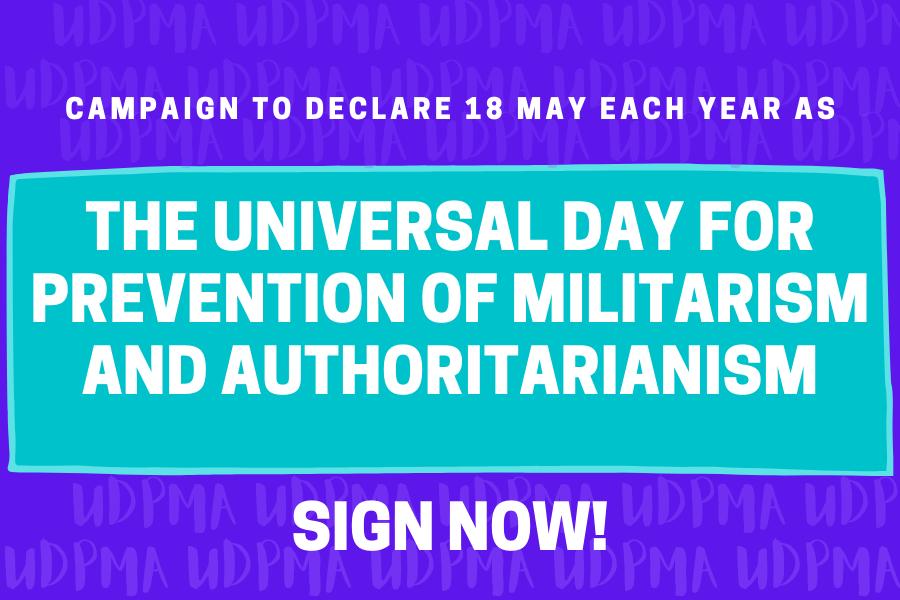CCA campaigns for declaration of 18 May as Universal Day for Prevention of Militarism and Authoritarianism

CHIANG MAI: The Christian Conference of Asia (CCA) joins a global cohort of civil society and faith based organisations to advocate for the declaration of 18 May each year as the Universal Day for the Prevention of Militarism and Authoritarianism (UDPMA).
Initiated by the May 18 Memorial Foundation in South Korea in association with the Asian Human Rights Commission, the campaign aims to raise awareness to end all forms of militarism and authoritarianism in the world today. Churches and the National Council of Churches in Korea (NCCK) also support the May 18 Memorial Foundation.
As those in power perpetuate militarism and authoritarianism throughout the world in the name of progress and development, it would not be an exaggeration to say that democracy has been displaced. Citizens are being alienated, isolated, repressed, and are rendered powerless.
While endorsing the campaign to end militarism and authoritarianism, the CCA General Secretary, Dr Mathews George Chunakara, stated that presently several Asian governments were suppressing virtually every form of dissent or opposition to militarism and authoritarianism. People’s movements, civil society organisations and human rights defenders in several Asian countries faced arbitrary arrests, imprisonments, extra-judicial killings, forced disappearances, torture, and various forms of ill-treatments, all of which were used by authoritarian regimes to curtail the legitimate rights of people. In such situations, the genuine voices of the masses and public participation through political self-determination needed to be safeguarded so as to protect the lives and security of citizens.
It has been repeatedly mentioned that some countries in the world suffer the consequences of ongoing militarism and authoritarianism, while others suffer due to their legacy. Many reports indicate that under the guise of the COVID-19 pandemic, governments are justifying their abuse of power through countering people’s movements for democratisation and human rights.
The campaign against the growing trend of authoritarianism and militarism in Asia serves as a reminder of the power of the people to determine their destiny.
18 May 1980 marked the commencement of a ten-day-long struggle of the people of Gwangju in South Korea against a brutal military coup. While fighting to protect their democracy, they faced violent suppression by the South Korean military dictatorship with great sacrifice of civilian life. Ultimately democracy was reinstated in South Korea and years later the leaders who orchestrated the violence were brought to book and convicted.
Stories such as this are familiar in many countries. The nature of the problem is such that each person can relate to it and identify with it. People around the world see themselves in the people of Gwangju. While the campaign to designate 18 May as the UDPMA is a shared struggle, it is also an expression of solidarity and it acknowledges the power of collective action.
Dr Mathews George Chunakara added that the CCA strongly believes in the spiritual mandate of ensuring genuine and transparent systems and structures that should be rooted in the principles of love, equality, and justice.
“As a fellowship of national ecumenical organisations and member churches, CCA reiterates its commitment to the task of facilitating the emancipation and realisation of a humane polity, thus leading to the establishment of a world free from militarism and authoritarian dictatorship. Our authentic discipleship calls us to transform the world as we know it, thus enabling us to take a step closer towards God’s redemptive plan for humanity,” the CCA General Secretary stated.
In a letter addressed to member churches and councils, the CCA General Secretary urged all to advocate for a worldwide campaign to declare 18 May each year as the Universal Day for the Prevention of Militarism and Authoritarianism.
Join the campaign! Appeal to the United Nations to declare 18 May as the Universal Day for Prevention of Militarism and Authoritarianism by registering your e-signature here: https://forms.gle/kP85qxaUBcFKaLQK8










